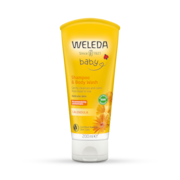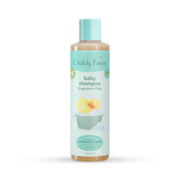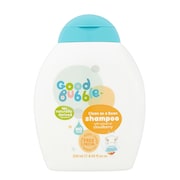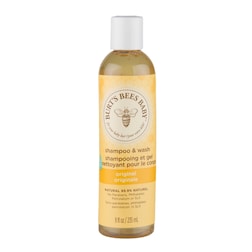15% off €25
Code:SPEND
The best baby shampoos

If you’re using regular shampoo on your baby’s hair – stop! Their scalp is made of more delicate stuff than ours, so they need a gentle shampoo free from nasties. Read on to find out more.
Our top picks
Vegan shampoo and bodywash

Weleda
Weleda Calendula Baby Shampoo & Bodywash 200ml
€10.50
Vegan unfragranced shampoo

Childs Farm
Childs Farm Baby Shampoo - Fragrance-free 250ml
€6.40
Vegan and suitable for toddlers and older kids

Good Bubble
Good Bubble Cloudberry Shampoo 250ml
€3.49
If you’re a parent, you’ll probably agree there’s nothing quite like the smell of your baby’s head.
In fact, studies have found that the smell given off by a baby’s scalp are designed to attract their mothers and facilitate bonding – so there’s a good reason you may not be able to stop sniffing it!1
However, your baby’s head does still get dirty and you do still need to wash it.
But what with? And how often? And which is the best baby shampoo?
Relax, we have all the answers.
Do I need to wash my baby’s hair?
You may think your baby’s hair never looks greasy or dirty, and it’s true that their oil glands aren’t producing large amounts of sebum compared to say, a teenager.
However, your baby’s hair still needs to be washed regularly to remove the dirt, bacteria and dead skin cells which build up there.
How often do I need to wash my baby’s hair?
Everyone has their own opinion on this topic, but a good rule of thumb is to wash your baby’s hair about three to four times per week.2
In most cases, every day is too often. Your baby won’t be getting very dirty (yet!) so daily hair washing isn’t necessary – plus it can strip the sebum (a gentle oil) and cause dryness to the scalp.
However, if your baby has cradle cap, it’s recommended that you wash their hair every day until the symptoms go away.
Handpicked content: What is cradle cap & how can I get rid of it?

When should I give my baby their first hair wash?
In terms of the first hair wash, you can do this from birth, especially if there is dried matter from the birth in the hair and scalp. Otherwise, a baby comb can be used to remove skin flakes and other debris.3
The NHS recommends that you only use plain water for newborn babies – and introduce mild cleansers from about four to six weeks.4
What is special about baby shampoo?
The main difference between baby shampoo and regular shampoo is that regular shampoo contains certain ingredients which are fine for adults, but are more likely to irritate sensitive baby skin.
Certain baby shampoo ingredients might be best avoided as they have the potential to irritate your baby’s scalp or eyes.
Look for the following ingredients, which offer a gentle wash without stripping the natural oils and causing dryness:
- Aloe vera – a gentle plant associated with hydration
- Chamomile – a soothing herb with a softening effect on the skin5
- Calendula – a herb known for soothing dry skin6
- Coco-betaine – a mild, natural substance derived from coconut oil which helps shampoo spread7
Some ingredients which pop up in personal care products contain very small amounts of substances which, in concentrated and high doses, have been linked with various health problems.
Other ingredients have been known to cause rashes, skin irritation and allergic reactions in some people. Baby skin is thin and sensitive, so exposure to potential toxins should be limited wherever possible.
We recommend you check with a healthcare professional before using any new ingredients on your newborn baby.
Take care when using the following ingredients:
- Cocamidopropyl betaine (CAPB)
This foaming agent helps water to mix with oil and dirt to enable them to wash away.8
Most babies won’t have any issue with CAPB – it’s considered very safe and even ‘hypoallergenic’, however, some children can be extra sensitive to CAPB and there’s been a link between its use and atopic dermatitis in children.9
- Parabens
Synthetic parabens are useful preservatives which stop mould and bacteria growing in your personal care products.
However, there have been concerns in recent years about parabens’ potential to disturb the hormonal balance and increase oestrogen levels. Some major companies have stopped using certain parabens in their baby products, and the EU banned them in products for newborns in 2014.10,11
- Phthalates
Phthalates are man-made chemicals which, much like parabens, might potentially interfere with hormones. Children under the age of three are more at risk from phthalates as their bodies are smaller.12
Don’t worry too much, though. Companies are aware of the concern surrounding phthalates, and in one 2011 review, 26 out of 30 baby products tested didn’t contain them.13
- Sodium lauryl sulphate (SLS)
Sodium lauryl sulphate (SLS), is a detergent found in many toiletries. It helps products like shampoos to foam, ensuring you get a really deep clean.
However, it has been linked with irritation in sensitive skin for some people, and exacerbating eczema, so not something you want to expose your newborn’s delicate skin to if you can avoid it.14 Soap contains SLS, so don’t use soap during your baby’s bathtimes.15
- Alcohol (may be listed as ethanol or isopropyl alcohol)
Alcohol is common in skincare products for adults, but it’s well-known in skincare circles to be potentially drying – bad news for sensitive or dry skin types.
Baby skin is especially sensitive, so products containing alcohol may lead to a dry scalp prone to flakiness or redness.
Don’t worry…
It’s natural for a parent to be concerned about what’s in their little one’s shampoo – but don’t lose perspective and become too worried.
In the UK, any skincare product must pass strict regulatory tests and is covered by a robust safety legislation.16
Can I use my usual shampoo on my baby’s hair?
No. There are ingredients in shampoos designed for adults which may irritate a baby’s scalp. These may have strong fragrances and colours which aren’t suitable for delicate newborn skin.
If your baby has dandruff, don’t use the same anti-dandruff shampoo that you’d use. These contain ingredients like salicylic acid which do a great job of sloughing off flakes on adult scalps – but are too harsh and are likely to be irritating for sensitive skin.
If your baby has dandruff, use soft baby brush during hair washes, or try a special baby dandruff shampoo until the flakes have cleared.

Do I need to wash my baby’s hair – even if they don’t have any?
Yes. Even if your baby is bald, their scalp will be covered with a soft down and the oil glands beneath will still be secreting sebum. Further, bacteria and dead skin cells will build up on the surface of their scalp. Wash your baby’s scalp gently two or three times a week to remove this.
Which is the best baby shampoo?
There are many options out there when it comes to baby shampoo. Luckily for you, we've rounded up some of the best shampoos for you to use on your baby's scalp, keeping it fresh and clean.
This award-winning 2 in 1 baby shampoo and body wash will help prevent dryness, while helping preserve the skin’s protective layer.
It contains no synthetic preservatives, fragrance or colours.
This mild and unfragranced baby shampoo does a great job of clearing away dead skin and grime while caring for the skin.
This plant-based shampoo & wash contains gentle moisturisers and soy proteins to gently clean your baby’s delicate skin and hair without drying it out.
This dermatologically tested formula is free from artificial colours. It’s got a fruity fragrance, so is great for toddlers and older kids.
Is it good to wash hair with baby shampoo?
Yes, you can wash your own hair with baby shampoo. The gentler formulas are great for anyone who suffers from scalp dryness or feels that regular shampoo is stripping their hair of natural oils leaving it dry.
It’s worth noting that you might not get as good a lather with baby shampoo, due to their lack of foaming agents like SLS.
Read next: Best mother & baby care products
The advice in this article is for information only and should not replace medical care. Please check with your GP or healthcare professional before trying any supplements, treatments or remedies. Food supplements must not be used as a substitute for a varied and balanced diet and a healthy lifestyle.
- https://www.sciencedaily.com/releases/2019/09/190927095253.htm
- https://www.nhsinform.scot/ready-steady-baby/early-parenthood/caring-for-your-new-baby/bathing-your-baby
- https://www.royalberkshire.nhs.uk/patient-information-leaflets/Maternity/Maternity---skincare-for-newborn-babies.htm
- https://www.nhsinform.scot/ready-steady-baby/early-parenthood/caring-for-your-new-baby/bathing-your-baby
- https://www.ncbi.nlm.nih.gov/pmc/articles/PMC2995283/
- https://www.ncbi.nlm.nih.gov/pmc/articles/PMC3841996/
- https://www.esteem-india.com/coco-betaine.php
- https://www.esteem-india.com/coco-betaine.php
- https://www.jaad.org/article/S0190-9622(19)33313-4/fulltext
- https://www.scientificamerican.com/article/johnson-and-johnson-removes-some-chemicals-from-baby-shampoo-other-products/
- https://ec.europa.eu/commission/presscorner/detail/en/IP_14_1051
- https://www.niehs.nih.gov/research/supported/assets/docs/j_q/phthalates_the_everywhere_chemical_handout_508.pdf
- https://pubmed.ncbi.nlm.nih.gov/22652904/
- https://onlinelibrary.wiley.com/doi/10.1111/bjd.19177
- https://www.independentnurse.co.uk/clinical-article/practical-advice-for-baby-skin-care/89080/
- https://www.ctpa.org.uk/faqs







